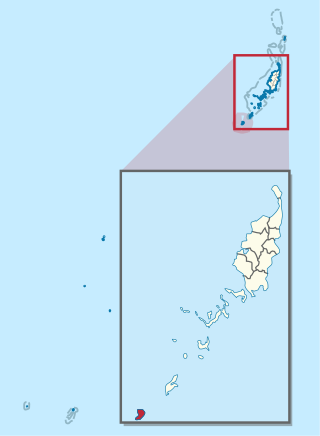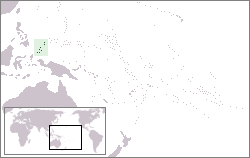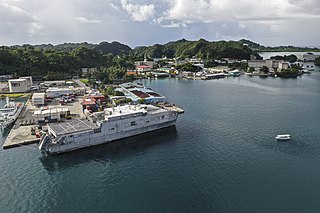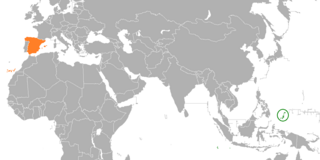 | |
Japan | Palau |
|---|---|
Diplomatic relations are maintained between Japan and Palau, a small island country in the western Pacific Ocean that was once a Japanese colony. There is a Japanese embassy on the Palauan island of Koror and a Palauan embassy in Tokyo.
 | |
Japan | Palau |
|---|---|
Diplomatic relations are maintained between Japan and Palau, a small island country in the western Pacific Ocean that was once a Japanese colony. There is a Japanese embassy on the Palauan island of Koror and a Palauan embassy in Tokyo.

The bilateral ties between the two countries originated in 1920, when Japan assumed control over the island colonies of the German colonial empire in the Pacific which included present-day Micronesia, the Marshall Islands, the Northern Marianas and Palau. The islands became part of the South Seas Mandate under the League of Nations and Koror was designated as the administrative center of the mandate. Under Japanese rule, Palau experienced significant development of its fishing, agriculture and mining industry. Palau achieved self-sufficiency to some degree during the period. [1] Palau also served as a Japanese military base during World War II. Japanese administration over the islands ended following the defeat of Japan in the World War II. The South Seas Mandate became the Trust Territory of the Pacific Islands and it was administrated by the United States. [2]
Japan recognized the independence of Palau from the United States on 1 October 1994 and established formal relations with Palau during the same year on November 2. The Japanese embassy in Koror opened in 1999. [1]
As a former Japanese colony, Palau was influenced by Japanese culture and as a result, many older residents speak Japanese and it is an official language in the state of Angaur. Contemporary Palauan has many words derived from Japanese such as "daijobu", "okyaku", "denki" and "senkyo". Local cuisine has also been influenced by the Japanese. [1]

Palau-based tuna shipping companies mainly export sashimi grade tuna to Japan. Licensing of fishing vessels from Japan remains a source of foreign exchange between Palau and Japan. [2]
Palau has supported Japan's whaling rights in the past but has since abandoned its support in June 2010 in favor of catch quota proposal being considered by the International Whaling Commission. Johnson Toribiong asserted that his country's policy change won't affect Japan–Palau relations and claimed that Japan is "mature enough" to accept Palau's stand on whaling. [3]
Japan has sent the Japan Mine Action Service to Palau to clear World War II bombs sitting dormant in Palau's seabed. The clearing operations started in May 2013 and will take about a year and half. [4]
Tourism is one of Palau's main industries, with the majority of its tourists coming from Japan and Taiwan. [2]

Palau, officially the Republic of Palau and historically Belau, Palaos or Pelew, is an island country in the western Pacific. The republic consists of approximately 340 islands and connects the western chain of the Caroline Islands with parts of the Federated States of Micronesia. It has a total area of 466 square kilometers (180 sq mi). The most populous island is Koror, home to the country's most populous city of the same name. The capital Ngerulmud is located on the nearby island of Babeldaob, in Melekeok State. Palau shares maritime boundaries with international waters to the north, the Federated States of Micronesia to the east, Indonesia to the south, and the Philippines to the northwest.

Palau was initially settled around 1000 BC.

The economy of Palau consists primarily of subsistence agriculture and fishing. The government is the major employer of the work force, relying heavily on financial assistance from the United States. The population enjoys a per capita income of more than twice that of the Philippines and much of Micronesia. Long-term prospects for the tourist sector have been greatly bolstered by the expansion of air travel in the Pacific and the rising prosperity of leading East Asian countries.

Koror is the state comprising the main commercial centre of the Republic of Palau. It consists of several islands, the most prominent being Koror Island. It is Palau’s most populous state.

The flag of Palau was adopted on 1 January 1981, when the island group separated from the United Nations Trust Territory. As with the flags of several other Pacific island groups, light blue is the color used to represent the ocean and the nation's place within it. While this puts Palau in common with the Federated States of Micronesia and other neighboring island groups, the disc on the flag is off-centre like that of the flag of Bangladesh, but in this case the disc represents the moon instead of the sun. The current flag was introduced in 1981 when Palau became a republic.

Peleliu is an island in the island nation of Palau. Peleliu, along with two small islands to its northeast, forms one of the sixteen states of Palau. The island is notable as the location of the Battle of Peleliu in World War II.

Angaur, or Ngeaur in Palauan, is an island and state in the island nation of Palau.

The South Seas Mandate, officially the Mandate for the German Possessions in the Pacific Ocean Lying North of the Equator, was a League of Nations mandate in the "South Seas" given to the Empire of Japan by the League of Nations following World War I. The mandate consisted of islands in the north Pacific Ocean that had been part of German New Guinea within the German colonial empire until they were occupied by Japan during World War I. Japan governed the islands under the mandate as part of the Japanese colonial empire until World War II, when the United States captured the islands. The islands then became the United Nations–established Trust Territory of the Pacific Islands governed by the United States. The islands are now part of Palau, the Northern Mariana Islands, the Federated States of Micronesia, and the Marshall Islands.

Roman Tmetuchl was a Palauan political leader and businessman. He grew up in Japanese-controlled Palau and joined the Kempeitai, the Japanese secret police, during World War II. After the war, he became the leader of Palau's Liberal Party. He worked in the Congress of the Trust Territory of the Pacific Islands from 1964 to 1978 and advocated for Palau gaining a separate status from the rest of Micronesia. He became governor of Airai and engaged in three unsuccessful Palauan presidential campaigns. As a businessman, Tmetuchl led several construction projects for his business holdings and for the Palauan community, including the Palau International Airport and a Seventh-Day Adventist clinic.

Palau–United States relations are bilateral relations between the sovereign nations of Palau and the United States. Palau has an embassy in Washington, DC, whilst the United States has an embassy in Koror. The current US Chargé d'Affaires to Palau is James Boughner

The following is an alphabetical list of topics related to the Republic of Palau.

Ngerulmud is the capital city of the Republic of Palau, an island nation in the Pacific Ocean. It replaced Koror City, Palau's largest city, as the capital in 2006. The settlement is located in the state of Melekeok on Babeldaob, the country's largest island, located 20 kilometers northeast of Koror City and 2 km northwest of Melekeok City. It is the least-populous capital city of a sovereign nation in the world.
There is a small Japanese community in the Pacific Island country of Palau, which mainly consists of Japanese expatriates residing in Palau over a long-term basis. A few Japanese expatriates started to reside in Palau after it gained independence in 1994, and established long-term businesses in the country. Japanese settlement in Palau dates back to the early 19th century, although large scale Japanese migration to Palau did not occur until the 1920s, when Palau came under Japanese rule and administered as part of the South Seas Mandate. Japanese settlers took on leading administrative roles in the Japanese colonial government, and developed Palau's economy. After the Japanese surrender in 1945, virtually all of the Japanese population was repatriated back to Japan, although people of mixed Japanese-Palauan descent were allowed to remain behind. People of Japanese-Palauan descent constitute a large minority of Palau's population as a result of substantial intermarriage between the Japanese settlers and Palauans. They generally identify with, conforming to cultural norms and daily lives with the Palauans.
Chinese have been settling in Palau in small numbers since the 19th century. The early settlers consisted of traders and labourers, and often intermarried with Palauan women. Their offspring quickly assimilated with the local populace and generally identify themselves as Palauan. In recent years, Palau has seen a growing expatriate business community from Taiwan, after Palau established formal diplomatic ties with Taiwan in 1999.

Palau–Philippines relations refers to the bilateral relations between Palau and the Philippines.
The 45th Pacific Islands Forum was held from 29 July to 1 August 2014 in Palau. The forum's official opening was held in the capital Ngerulmud, in Melekeok State, but the majority of events were held in Koror, Palau's largest city and former capital. The official theme of the meeting was "The Ocean: Life & Future". Topics under discussion include climate change, commercial fishing, non-communicable diseases and the possibility of readmitting Fiji to the forum.

Koror City is the largest city and the commercial center in Palau, home to about half of the country's population, located on Oreor Island. During the interwar period it served as the capital of the South Seas Mandate, a group of islands that made up the League of Nations mandated territory held by the Empire of Japan. It was subsequently the capital of Palau until it was replaced by Ngerulmud in 2006.

Palau–Spain relations are the bilateral and diplomatic relations between these two countries. Palau currently has no diplomatic or consular representation in Spain. However, Spain has a consulate in Koror, while the embassy representing Spain for Palau is in Manila, Philippines.
Palauan nationality law is regulated by the 1980 Constitution of Palau, as amended; the 1994 Palau Citizenship Act, and its revisions; and international agreements entered into by the Palauan government. These laws determine who is, or is eligible to be, a national of Palau. The legal means to acquire nationality, formal legal membership in a nation, differ from the domestic relationship of rights and obligations between a national and the nation, known as citizenship. Palauan nationality is typically obtained either on the principle of jus soli, i.e. by birth in Palau or under the rules of jus sanguinis, i.e. by birth abroad to parents with Palauan nationality. It can be granted to persons with an affiliation to the country through naturalization.

Palau–Taiwan relations are the bilateral relations between Palau and Taiwan. Palau maintains an embassy in Taipei and the ROC maintains an embassy in Koror City. Exchanges between the two nations range from agriculture, culture, education, fishery, medical services, tourism and water supply infrastructure.
{{cite web}}: CS1 maint: bot: original URL status unknown (link)